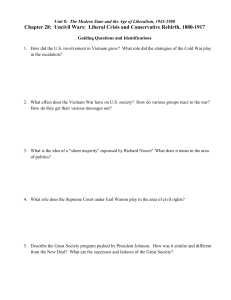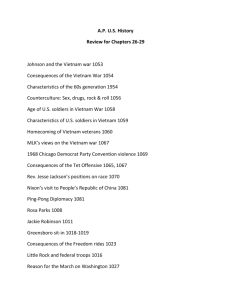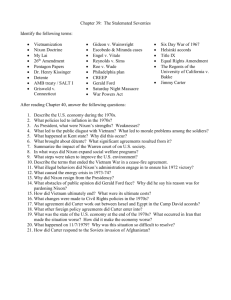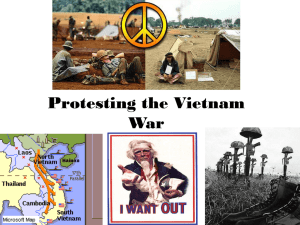Final Exam - Study Guide
advertisement
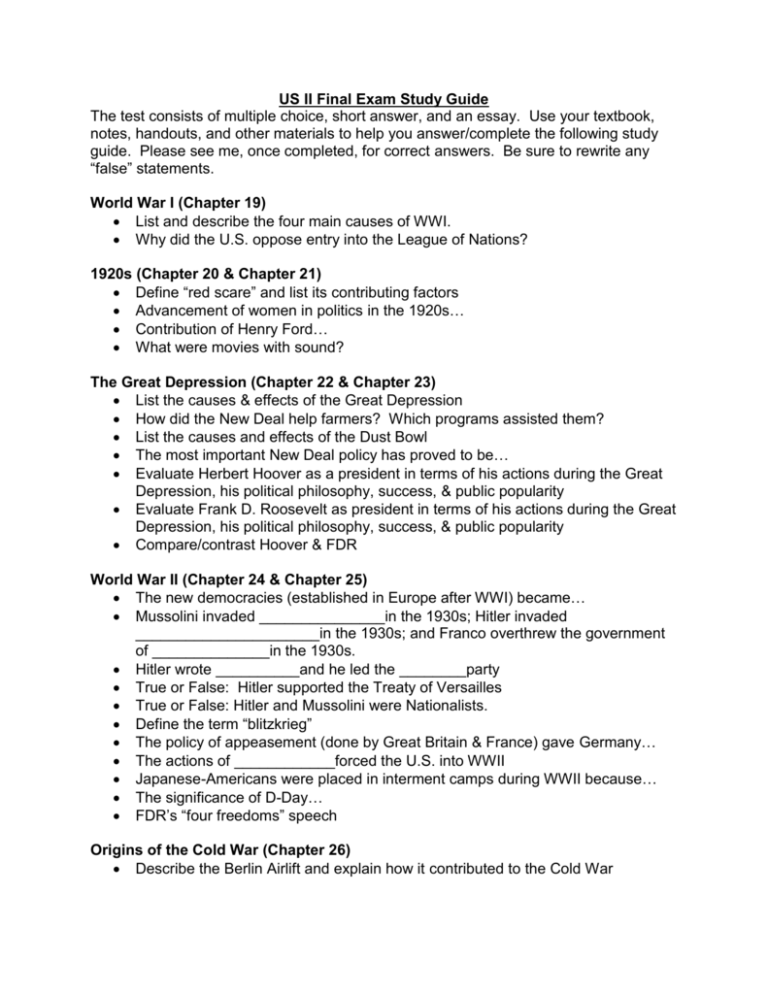
US II Final Exam Study Guide The test consists of multiple choice, short answer, and an essay. Use your textbook, notes, handouts, and other materials to help you answer/complete the following study guide. Please see me, once completed, for correct answers. Be sure to rewrite any “false” statements. World War I (Chapter 19) List and describe the four main causes of WWI. Why did the U.S. oppose entry into the League of Nations? 1920s (Chapter 20 & Chapter 21) Define “red scare” and list its contributing factors Advancement of women in politics in the 1920s… Contribution of Henry Ford… What were movies with sound? The Great Depression (Chapter 22 & Chapter 23) List the causes & effects of the Great Depression How did the New Deal help farmers? Which programs assisted them? List the causes and effects of the Dust Bowl The most important New Deal policy has proved to be… Evaluate Herbert Hoover as a president in terms of his actions during the Great Depression, his political philosophy, success, & public popularity Evaluate Frank D. Roosevelt as president in terms of his actions during the Great Depression, his political philosophy, success, & public popularity Compare/contrast Hoover & FDR World War II (Chapter 24 & Chapter 25) The new democracies (established in Europe after WWI) became… Mussolini invaded _______________in the 1930s; Hitler invaded ______________________in the 1930s; and Franco overthrew the government of ______________in the 1930s. Hitler wrote __________and he led the ________party True or False: Hitler supported the Treaty of Versailles True or False: Hitler and Mussolini were Nationalists. Define the term “blitzkrieg” The policy of appeasement (done by Great Britain & France) gave Germany… The actions of ____________forced the U.S. into WWII Japanese-Americans were placed in interment camps during WWII because… The significance of D-Day… FDR’s “four freedoms” speech Origins of the Cold War (Chapter 26) Describe the Berlin Airlift and explain how it contributed to the Cold War What countries were in the NATO alliance? What countries were in the Warsaw Pact? The NATO Alliance & the Warsaw Pact contributed to the Cold War by… Mao Zedong brought a ________________government to China Describe the Korean War, including how it increased Cold War tensions The Korean War became unpopular because… North Korea & South Korea are divided by… The House Un-American Committee investigated ______________in the film industry True or False: The main goal of the Truman Doctrine was to restrict the spread of Communism Define the term “McCarthyism” 1950s Culture (Chapter 27) What is the Baby Boom? Why did it happen? How does it continue to impact the U.S. today? The U.S. experienced a wave of consumerism in the 1950s because… Americans were very fearful of ____________during the Cold War era. JFK & LBJ (Chapter 28) Kennedy and Johnson both based their foreign policies on stopping the spread of ___________________. Describe the Bay of Pigs Invasion Describe the Cuban Missile Crisis Major components and purpose of Johnson’s Great Society The Berlin Wall went up because…? How did this contribute to the Cold War? Who was president when this happened? How did this president react? The Civil Rights Movement (Chapter 29) Impact of the decision in the Brown vs. Board of Education Case True or False: Dr. King believed in the use of violence Describe the major events, people, successes, & failures of the Civil Rights Movement; include causes and effects, and impact on America today The Vietnam War (Chapter 30) Main goal of U.S. regarding Vietnam American soldiers experience in Vietnam Describe the causes, effects, events, people, successes, & failures of the AntiWar Movement Why did the Vietnam War become unpopular with many Americans? How did this affect US war strategy, presidential politics, and outcome of the war? Who was Ho Chi Minh? How does the Vietnam War continue to influence U.S. foreign policy today? The Vietnam War added to Cold War tensions by… What was the opinion of Americans toward U.S. involvement in Vietnam? How did this opinion change over time? Major events of the Vietnam War Why was the release of the Pentagon Papers significant? Nixon’s policy of “Vietnamization” Vietnam Political Cartoon Social Change in the 1960s/1970s (Chapter 31) Characteristics of the Counterculture Lyrics of Bob Dylan’s The Times They Are A-Changin’ (1962) Reasons behind the Women’s Movement Define the term “feminism” Identify the important events, people, successes, & failures of the Women’s Movement How does Women’s Movement continue to influence the U.S. today? 1970s (Chapter 32) Watergate scandal/Nixon’s resignation Nixon resigned because he was guilty of _________________. ___________ became president when Nixon resigned. What has been the most lasting effect of Watergate? Major theme of book Silent Spring Identify the important events, people, successes, & failures of the Environmental Movement Describe the policies, and evaluate the effectiveness of the presidencies of Nixon, Ford, and Carter How does Environmental Movement continue to impact U.S. policy today? Guiding principle of President Carter’s foreign policy Problems with U.S. economy in the late 1970s The Conservative Tide/1980s (Chapter 33) Goals of the conservative movement in the 1980s First women justice on the Supreme Court was… First woman on a major party’s presidential ticket was… Describe the policies, and evaluate the effectiveness of the presidencies of Reagan and Bush Reagan’s greatest strength as president was… What was one of the most troubling health issues to emerge in the 1980s? The official end of the Cold War was when _____________was taken down Modern America (Chapter 34) What charges were brought against Clinton in the 1998 impeachment trial? Explain the issue during the Election of 2000 Describe the policies, and evaluate the effectiveness of the presidencies of Clinton and Bush Describe the 9/11 terrorist attacks


